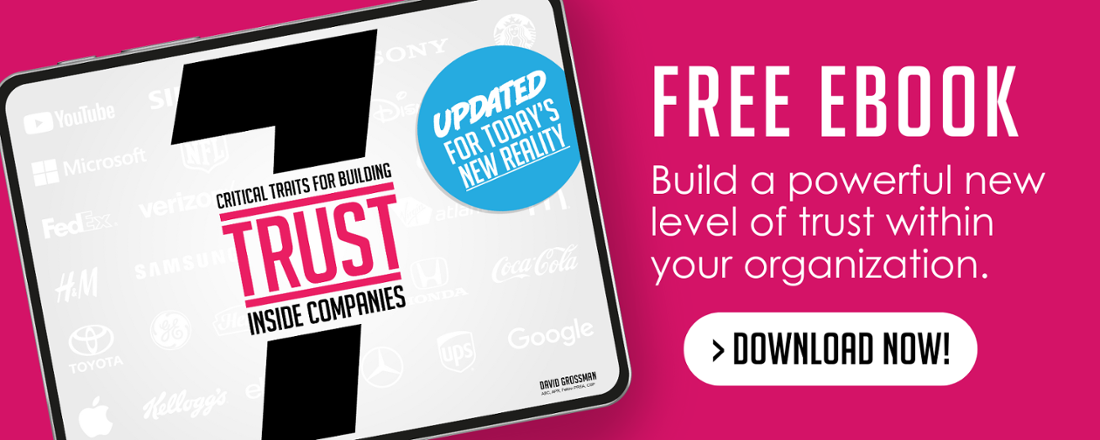February 13, 2023
3 Takeaways for Internal Communications from the 2023 Edelman Trust Barometer
Written by:
Debbie Field

The 2023 Edelman Trust Barometer is hot off the presses and chock-full of valuable information. This tried-and-true resource for more than two decades provides data-based insights on trust and credibility by helping readers to understand those institutions that people turn to most when they need information, guidance, or a general pulse on decision-making influencers.
This year, the Barometer shows that the most trusted sources of information are:
- Scientists (76%)
- My coworkers (73% among employees)
- My CEO (64% among employees)
Notably, the Edelman Trust Barometer also looks at the level of trust people have in four key institutions: NGOs, business, government, and media.
3 of the Biggest Takeaways for Internal Comms from the Edelman Trust Barometer
When it comes to moving the needle on internal communication and employee engagement, there’s no better data than that which helps us understand the level of trust employees place in their employers (e.g., business) and the topics on which they turn to their employers as the trusted source for insights. Following are some of the key takeaways important to the world of internal communications:
1. Leadership communications isn’t optional.
As the trusted entity of choice by 62% of respondents, business remains the most and only trusted institution globally, which makes leader visibility plans, message platform tools, and executive communications coaching a must-have in the internal communications arsenal.
With a 53-point lead over government in competence and 30 points ahead in ethics (a 20-point jump over the past three years), business is now viewed as the only global institution to be both competent and ethical.
“Where there is great power, there is great responsibility.”
Whether you attribute this adage to Winston Churchill or Spider-Man (there’s a hot online debate as to the originator), the meaning holds true. As public confidence in government and media continues to wane, people are placing their trust elsewhere and businesses are the logical recipient.
For leaders this means that employees expect so much more than a paycheck from their employers – they expect leaders to serve as a reliable source for news happening outside of the workplace, be transparent about how that news is impacting both the business and the lives of those linked to that business, and make decisions based on more than just the bottom line.
One way for leaders to do this in a meaningful way for both employees and the business is to consistently look for ways to link the latest news they are sharing back to a key business message, such as a strategic priority. This not only helps employees stay informed about the world around them, but it helps them better understand how their day-to-day work fits into the bigger picture.
We’ve found that having a tool such as the leadercommunicator platform saves time and empowers leaders to remain flexible yet responsive no matter the topic that arises.
2. Internal communications can play a key role in ensuring head (strategy) and heart (doing what’s right) are able to co-exist in business.
People want more societal involvement by business on issues such as climate change, economic inequality, and workforce reskilling. Expanding upon the first takeaway, making decisions based on more than just the bottom line means taking a stand on societal issues and the report shows that by a six-to-one margin, respondents want to see business taking a stand.
Of course, this must be done thoughtfully and strategically by identifying those issues that link back to the business’ core competency and/or that directly impact the organization’s stakeholders – whether that be employees, customers, or the communities in which they operate. We’ve worked with a number of clients to develop a customized matrix to determine if a societal issue warrants a business taking a stand on the topic and potentially engaging with solutions.
This helps employees understand the rationale behind why a leader may choose to speak on a potentially divisive topic or not – another important finding from the report that indicates more than half (52%) believe that businesses run a high risk of being politicized when they address societal issues – and also allows communicators to act quickly in developing messaging and an action plan when the need arises.
3. When economic uncertainty rises, so too, must employee communications.
There is a notable loss of economic optimism across the globe. As the new era of “loud layoffs” drives a new level of anxiety across the workforce, business leaders face the harsh reality that impacts employee engagement at its core: in the last year, there’s been a 10% drop (50% to 40%) in respondents who believe that their families will be better off in five years.
In fact, results show that personal economic fears such as job loss (89%) and inflation (74%) are now on par with urgent societal fears like climate change (76%), nuclear war (72%) and food shortages (67%). In essence, there’s a lack of confidence in the stability of the job market and economy as a whole, which means employees are operating from a place of fear and are desperate for affirmation that they are valued for the work they do and are working for a company that is stable enough to weather whatever challenges lie ahead.
That’s a lot of responsibility for business to hold, but it also offers a window into the mindset of today’s employees. What can leaders do to address this reality? One of the most important steps leaders can take during times of uncertainty is to remain visible and encourage two-way dialogue and all-employee town halls are a great way to accomplish both.
While many companies host all-employee meetings, we all know that not every town hall is created equally, and today’s evolving work environment makes it all the more challenging. That’s why we’ve developed an eBook outlining 10 Ways to Make the Most of Your Town Hall and Unleash the Power of Your Hybrid Teams. When done right, town halls can foster the critical connections employees need as the world faces an uncertain economic future.
Internal Communications Can Help Businesses Navigate a Polarizing World
Just as the subtitle of the 2023 Edelman Trust Barometer indicates – we are “Navigating a Polarized World” with the report deeming nearly one-quarter of the countries surveyed (including the United States) as “severely polarized.” And, it’s clear that businesses are expected to serve as the beacon that leads employees, customers, and communities forward.
Delivering on this expectation means now is the time for business leaders to hone their skills as communicators by elevating their voices, engaging employees at all levels, and articulating a clear vision for the future. For the teams supporting them, that means having in place the tools, channels, and plans that are necessary to drive those internal communication efforts effectively and clearly.
What steps are you taking to ensure that your leadership, internal communications, and employee engagement teams are working together to seize the opportunities that come with being the most trusted societal institution?
—Debbie Field
Take a deeper dive into building trust in your organization and see how it leads to better business outcomes. Click below to download the – 7 Critical Traits for Building Trust Inside Companies – eBook today!
About Debbie
 Debbie is Vice President at The Grossman Group where she provides internal, executive, and change communication solutions through strategic communication planning and delivery. She has worked across industries including healthcare/pharma, higher education, technology, and public utility, among others. Some of her clients include Emergent BioSolutions, Boston Children's Hospital, NYU Langone Health, Kaiser Permanente, Southern New Hampshire University, and NiSource, to name a few. Connect with Debbie on LinkedIn here.
Debbie is Vice President at The Grossman Group where she provides internal, executive, and change communication solutions through strategic communication planning and delivery. She has worked across industries including healthcare/pharma, higher education, technology, and public utility, among others. Some of her clients include Emergent BioSolutions, Boston Children's Hospital, NYU Langone Health, Kaiser Permanente, Southern New Hampshire University, and NiSource, to name a few. Connect with Debbie on LinkedIn here.
Other posts you might be interested in
View All Posts
Internal Communication
11 min read |
August 1, 2022
5 Trends Happening in Internal Communications Right Now: What’s Driving Them and What You Can Do in Response
Read More
Internal Communication
10 min read |
March 31, 2021
Communication: The Key to Workplace Vaccination Policy Adoption
Read More
Leadership
14 min read |
March 29, 2021


Comments on this post